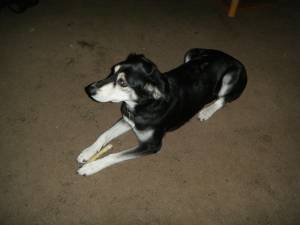Disclosure: In any review for a product or service, products or compensation may have been provided to me to help facilitate my review. All opinions are my own and honest. I am disclosing this in accordance with FTC Guidelines. Please see “Disclose” and "Terms of Use" tabs for more information.
Winter weather, snow and ice, winter chemicals, and outdoor activities can negatively affect your cat and dog. Here is some advice from the New Jersey Veterinary Medical Association to help keep your pet safe this winter:
-
Prevent Frostbite – When the temperature dips below 20 degrees Fahrenheit, outdoor dogs and cats should be brought into the house. At this temperature, outdoor animals can get frostbite on their noses, ears, and feet. Extra caution should be taken with very young or elderly animals as they are especially sensitive to the cold.
-
Provide Suitable Housing – If a dog must remain outside, make sure you provide your furry friend with a dog house. Houses should be elevated a few inches off the ground (the air space creates insulation) and lined with straw, hay, or blankets to help your pet retain body heat. Consider placing a flap over the entrance to keep out drafts. Face the door away from the North or West to avoid cold winds. Dog houses should be cozy and not oversized. A dog’s body warms the environment and a house that is too big cannot be warmed efficiently.
-
Check Water Supply – Be sure the water in your pet’s bowl doesn’t freeze. Animals must have access to fresh water at all times, even in the winter. Eating snow is not an acceptable alternative. Use ceramic or plastic water bowls rather than metal. You pet’s tongue can get stuck to a frozen metal bowl, causing pain and injury.
-
Adjust Your Pet’s Diet – Pets who spend a lot of time outdoors during the winter, burn more calories in an effort to stay warm. Meanwhile, pets who spend the majority of the winter indoors, can be fed normally so they don’t gain weight. Speak to your veterinarian about adjusting your pet’s diet.
-
Wipe Those Feet! <span style=”font-family: arial,helvetica,sans-serif;”> – Chemicals used to melt snow and ice can irritate and burn paw pads. Be sure to wipe your pet’s feet after coming indoors to remove these chemicals so your pet will not ingest them. Doing so can cause skin irritation or an upset stomach. Also be sure to remove any snow or ice that has accumulated between the pads, otherwise, your pet may have difficulty walking.
-
Use Pet Friendly Antifreeze – Pets love the sweet taste of antifreeze but the consequences can be deadly. If you keep antifreeze in the garage, consider purchasing a pet friendly brand in case it spills and your pet comes into contact with it. Since neighbors may not be as careful, do not allow your pet to lick anything from driveways or roadways. Ingesting antifreeze is a very serious emergency. Contact your veterinarian immediately.
-
Beware of Cats in Your Car – Outdoor cats often seek refuge under the hood of cars to take advantage of heat from the engines. Bang on your car’s hood or honk your horn before starting your car to alert cats of your presence. Cats who don’t exit in time, can become injured.
-
Do Not Leave Your Pet In The Car – Most people are aware of the dangers of leaving pets in the car during warm weather. The same holds true in cold weather. Cars become extremely cold and your pet could suffer from hypothermia.
-
Pet Identification — Be sure your pet wears identification tags with current contact information while playing outdoors.
-
Indoor Precautions – During the winter months, be sure to pet proof your home. Keep screens around fireplaces and wood burning stoves so your pet cannot get too close and burn himself. The same holds true for space heaters where he can not only burn himself, but knock it over and cause a fire.

















Great tips. Glad we don’t have to worry about this – Well some tips are universal :). I don’t think my dogs would know what to do with themselves in the cold.
We bang on the hood to make sure none of the neighbor’s cats are there.
there is a cat that sleeps ON my car all the time